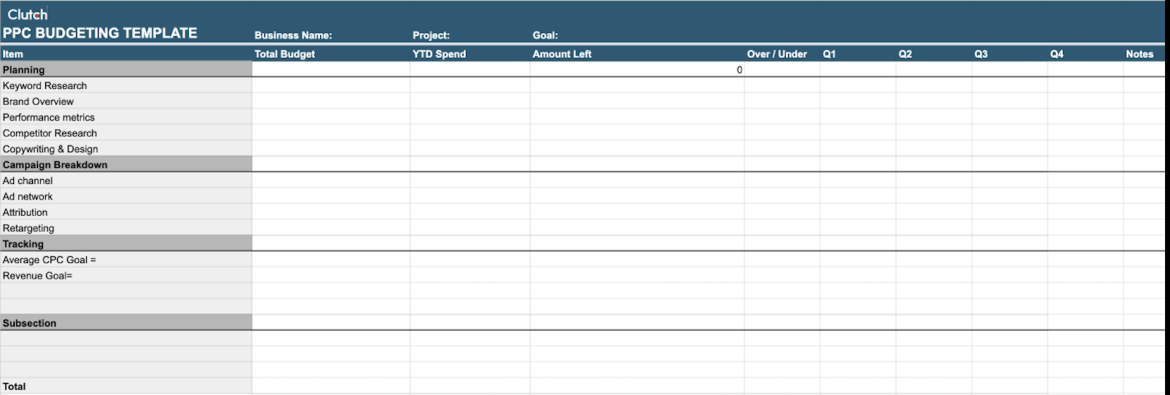

Updated December 18, 2025
Having a defined budget for your PPC services and campaigns will ensure that your company stays organized and efficient.
Digital marketing is at the subset of every business. But what marketing strategies a business chooses to invest in depends on numerous factors.
A popular marketing strategy that businesses invest in to generate leads, boost brand awareness, and drive traffic is PPC.
Looking for a Digital Marketing agency?
Compare our list of top Digital Marketing companies near you
PPC (pay-per-click) advertising is a model that helps your company advertise online and appear in SERPs. Unlike SEO, PPC focuses on advertising, meaning that PPC campaigns come in different shapes and sizes but include targeted ads that generate fees through clicks.
Each time one of your ads is clicked, the advertiser pays a fee - meaning that your company is paying for targeted visits to your website.
There are numerous factors to consider when getting started with PPC, a budget being one of the most important. Without a PPC budget, your business will be lost in the complexities of the field.
This article dives into the insights of PPC campaigns, how to craft a specialized budget for a PPC strategy, steps for creating a PPC ad campaign, and a helpful template to get your marketing team started.
Hire a PPC services agency to help with your PPC campaigns.
Many variables need to be considered to craft a successful marketing budget for PPC.
The following practices are involved in building a PPC campaign budget:
A PPC budget defines how much money a company is willing to spend. Once these elements and target metrics are defined, a PPC budget can become established to accompany any size campaign.
Calculating the right PPC budget can be tricky with all the different factors and considerations that pop up.
Start with a basic step-by-step approach to get started.
Businesses can build a successful PPC budget by following these steps:
Before settling on a search campaign, your team needs to identify the search terms or keywords your target demographics are using to find your product or service.
Focus on keywords that have immediate resonance and purchase intent with your audience - these will likely lead to a higher conversion and click-through rate (CTR).
Use a keyword planner to keep all of your ideas organized for your ad campaigns.
Are there words your company doesn’t want your services to show up for? Those are considered negative keywords — for your PPC campaigns, you can set those up as words that your business never wants your search ads to trigger for.
Once your goal for your PPC strategy is set, your business needs to determine how much time and investment goes into building up your traffic requirements.
To figure this out, use tools like Google Analytics to look at past data and compare it to the current search volume of the keywords you have planned.
Using analytics, you can also view your site’s overall conversion rate to get an idea of how users are converting, which will in turn help with planning for your next round of PPC planning.
Knowing how your website performs when it comes to key metrics will help your team form a more solid budget for PPC.
Once your team has an idea of how much traffic your business will need to reach your goal, it is time to gain more of an understanding how what you will need for your CPC.
Cost-per-click (CPC) is the advertising model that websites use to bill advertisers based on the number of times users click on their advertisements.
Google’s Keyword Planner is a great resource to help plan your overall PPC efforts. This tool estimates costs and search volume, which your team will need to calculate CPC.
When your team understands how your team has performed in the past and the competitiveness around certain search terms, your PPC budget can factor in the need for more research in certain areas.
Additional Reading: 'PPC Pricing Guide'
All PPC campaigns should have a measurable goal - if your company wants to see a strong average CPC or return on your ad budget, think about that when planning aspects of your PPC budget.
PPC campaigns can be broken down in different ways through the use of various strategies:
ROAs generally only count the price of a customer’s first purchase toward ad campaign revenue. Calculating this is dependent on your overall business plan and model.
Your PPC campaign's average cost should be reevaluated to your company over time. Ultimately, the lifetime loyalty of customers is more than enough.
Testing is a big aspect of PPC — not everything you try will work.
While crafting your first PPC budget, think critically about what is achievable. Your company can revamp your budget as much as possible.
Consult professionals to figure out what works and what doesn’t - not every PPC strategy works well for each company, so try not to overthink if something doesn’t seem to factor into your budget.
Over time, you will have to spend time in allocation mode or restructure your keywords and search terms. All of these come as practice while budget planning.
Now that your marketing team knows what to focus on, start planning out your PPC budget.

Download this template for your PPC budget planning.
Traditional PPC advertising follows a specific equation to yield the total cost to advertisers:
Number of clicks x Cost per Click = PPC Cost
Several other factors impact the cost of PPC, including:
As your company works through and adjusts your PPC campaigns and budget, all of these factors should be considered.
If your company is stuck on how to create a PPC campaign, follow these steps to develop an effective PPC strategy:
Step 1: Define your PPC goals
Step 2: Research your target audience
Step 3: Optimize landing pages and other materials
Step 4: Build the ads
Step 5: Analyze and optimize
These five steps are all your marketing team needs to start developing a competitive PPC strategy with a smart campaign.
Many companies utilize digital marketing in their overall business strategy. PPC should be essential to all businesses that want to target potential customers with focused advertising and marketing campaigns.
With a well-researched PPC strategy, your business and brand can spread to millions.
Creating set budgets for your PPC campaigns limits the workload. Use our template to help your marketing team plan the most effective search campaigns.


